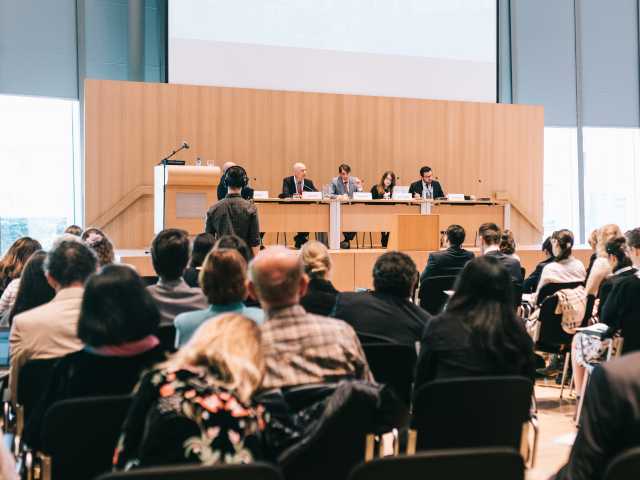The IBA conference on War and Justice: An overview
| Datum: | 26 april 2018 |
| Auteur: | Sven Flier |

Global Criminal Law LLM student Sven Flier attended the International Bar Association (IBA) conference on War and Justice in The Hague on April 21st at the invitation of the IBA. Below is his review of the event.
On Saturday 21st April 2018, I had the honour to attend the IBA Annual Conference on International Criminal Law: War and Justice. I was invited to the event as a chosen delegate of the Faculty of Law of the University of Groningen.
The day started with my arrival and the registration at the Peace Palace in The Hague, a beautiful venue for an event like this. Soon after, the conference was opened by Federica D’Alessandra and Gregory Kehoe, co-chairs of the IBA War Crimes Committee. However, the most impressive part of the opening was the keynote speech of Navanethem Pillay. She addressed several historic and current issues, from the Nuremburg tribunals up to the recent developments in Syria, the United Kingdom, and the United States.
The first panel focussed on the topic of terrorism, armed conflict and the permissible use of force. How does the fight against terrorism influence the rules of war, what is the effect of introduction of drones and also where do we draw the line between Ius in bello and Ius ad bellum. In the discussion, much attention was paid to the responsibility to protect and the boundaries of self-defence. The panel was very diverse and both the military and judicial perspective were covered extensively. The panel-members raised some very interesting points regarding the boundaries of the permissible use of force, the role of non-state combatants, and the rules of war.
The second panel dissected the ICC activation of the jurisdiction on aggression. In December 2017, the ICC’s assembly of states decided to active the jurisdiction over the Crime of Aggression, which will become effective in July 2018. The panel discussed the activation in a step-by-step approach, the preparatory efforts of the committee, an in-depth explanation of art. 8 bis of the Rome Statute, prosecutorial difficulties, and other challenges to the ICC. In conclusion, mention should be made of Sheryn Omeri’s interesting case analysis of the failed attempts of prosecution on the domestic level of the United Kingdom in the aftermath of Iraq. The case analysis shows how difficult it is to prosecute those people considered as the ‘good guys’, like Bush and Blaire.
After lunch, there were two more panels, but also the update on the report conducted by the IBA War Crimes committee on North Korea and the existence of camps for political prisoners in its territory. The update covered several grave human rights violations, as were illustrated by some horrific quotes taken from the interviews conducted by the committee.
In the third panel, academics and practitioners elaborated their views on the following question: ‘Is truth the first casualty of war?’ It focussed on several issues like the Syrian Sarin gas attacks, the Russian invasion of Ukrainian territory and so-called ‘fake news’. Justice should both aim to facilitate the truth and aim to protect against manipulation of this same truth. However, the current political affairs have not only impacted the general public, but also the contesting views endanger effective cooperation and the stability of the international community as a whole. Moreover, Mr. Wayne Jordash QC and Howard Morrison both had very interesting and passionate monologues, which resonated with me.
The substantive part of the conference was concluded with a final panel that was aimed at the future of international criminal law. It assessed the current status of international criminal law and which direction it is heading, international or domestic. The panel was filled with experience and knowledge: Michelle Jarvis, Stephen Rapp, James Stewart and the most experienced of them all, a real international criminal law-veteran, Christine van den Wyngaert. The panel analysed the role of international and domestic courts, the current balance between the two, and the future of international criminal law. The panel agreed on a rather important role for domestic courts and executives in protecting international criminal law, but also acknowledged that the need for an international institution would not cease to exist.
The day was concluded with interesting informal conversations that were accompanied by a drink and a snack. Eventually, I had to leave the premises of the peace palace, but with new insights, motivation and new contacts. As I left the gate I had one last look back at the Peace Palace as the golden glow of the setting sun made this stronghold of international law look even more impressive than it already is.

